#勉強
Text
Recommendation: Apps for Japanese Learning

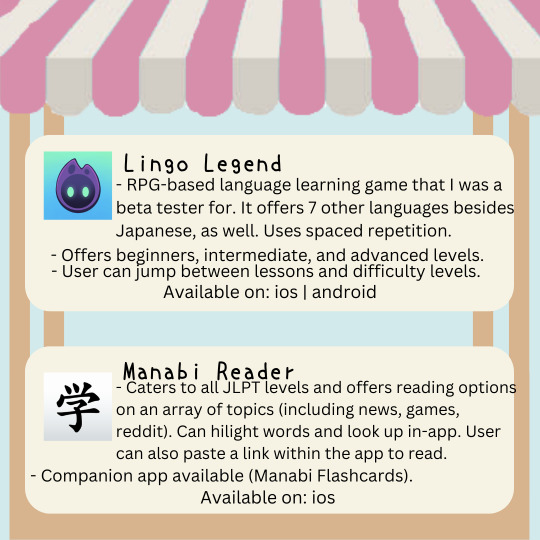
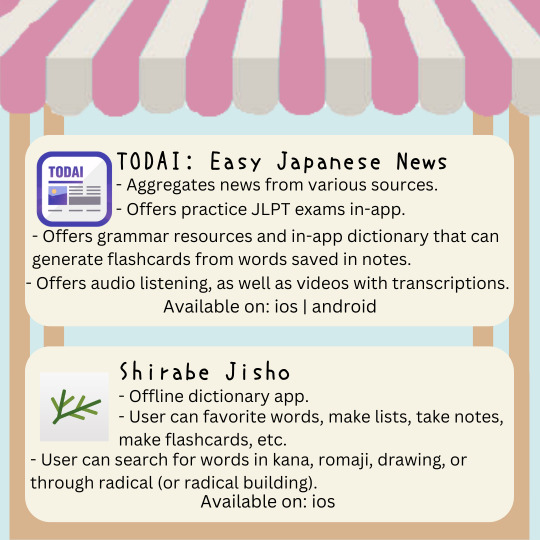

Over the years, I've downloaded and tested many apps. Though my favorite app was discontinued (I miss you, mindsnacks Japanese), there are still others that I don't think I'll be removing from my phone any time soon. In light of duolingo's horrible update causing a large migration and search for other apps, I thought I'd share some of my favorites. Also, some of these apps have websites or discords for you to interact with other users or to ask support questions.
For those who cannot use/don't like the graphics, the written out version is below the break.
Lingo Legend
RPG-based language learning game that I was a beta tester for. It also offers Spanish, French, Japanese, Korean, Mandarin Chinese, German, Italian, and Portuguese. Uses spaced repetition.
Offers beginners, intermediate, and advanced levels.
User can jump between lessons and difficulty levels.
Available on ios and android
Manabi Reader
Caters to all JLPT levels and offers reading options on an array of topics (including news, games, reddit). Can hilight words and look up in-app. User can also paste a link within the app to read.
Companion app available (Manabi Flashcards).
Available on ios
TODAI: EASY Japanese News
Aggregates news from various sources.
Offers practice JLPT exams in-app.
Offers grammar resources and in-app dictionary that can generate flashcards from words saved in notes.
Offers audio listening, as well as videos with transcriptions.
Available on ios and android. Also has a website.
Shirabe Jisho
Offline dictionary app.
User can favorite words, make lists, take notes, make flashcards, etc.
User can search for words in kana, romaji, drawing, or through radical (or radical building).
Available on ios
Renshuu
Think quizlet, but solely for Japanese. You can create your own lists, use others, play shiritori, earn prizes and interact on forums.
You can study grammar, kanji, vocab, flashcards, learn and submit mnemonics. You can also friend people.
Available on ios and android. Also has a website (of which I am an avid user).
Connect with me: Ko-fi Shop & Tips | Discord | Studygram | Ask Box
↳ psst! my ko-fi shop has learning resources on it. try to check back for new things bc im always working on something to add in there
#onigiristudies#heydilli#jpnstudynet#look toki#looktoki#look asta#japanese#langblr#study japanese#learn japanese#language apps#jlpt#jlpt kanji#jlpt studies#kanji#japanese grammar#日本語#勉強#learning through immersion#bookblr#studyblr#hey guys#kingyo hut#my shop#thanks for reading my research posts and my suggestion posts
1K notes
·
View notes
Text
Stop using pronouns in Japanese.
If you are an English speaker, you will often use pronouns to refer to yourself and other people. Sentences in English will not make sense if someone asked you, "What nationality?" and you respond, "Am American".
See what I did there? I removed the pronouns in English and it sounds pretty odd. Maybe it makes sense in context, but it's unnatural either way. In Japanese however, you will usually leave out pronouns, especially when talking about yourself. You don't want to constantly mention yourself when you are talking about your actions. Scenarios:
You hang out with a friend and say you have to go back home in the most beginner-ish way you can say it:
私は家に帰ります。
This is textbook Japanese and it sounds so odd. When you end a sentence with the standard present tense like 行く or 行きます、without a pronoun there, it automatically refers to yourself. Unless of course the subject was a question about someone. Else in the above scenario, especially when you're asked something, just omit the pronoun:
家に帰ります。
In real life situations, you also don't really want to refer to others as 彼 or 彼女。Use their name instead, since you definitely don't want to use any iteration of "you", like あなた。
Even when trying to say something like "Is this your pen?" should be rather phrased like
これはA子さんのペンですか?
Even then this sentence is a wee bit odd, I'd rather it be:
このペンはA子さんのですか?
There's also slightly different nuances to be used in formal and informal speech, but I don't have too much experience in the former.
#japanese#日本語#language learning#日本#japanese langblr#langblr#language#勉強#言語#japanese learning#grammar#japanese language
269 notes
·
View notes
Text
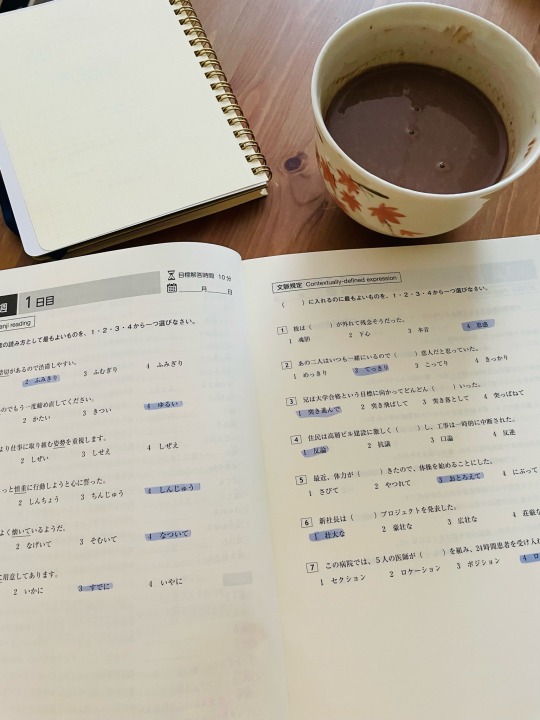
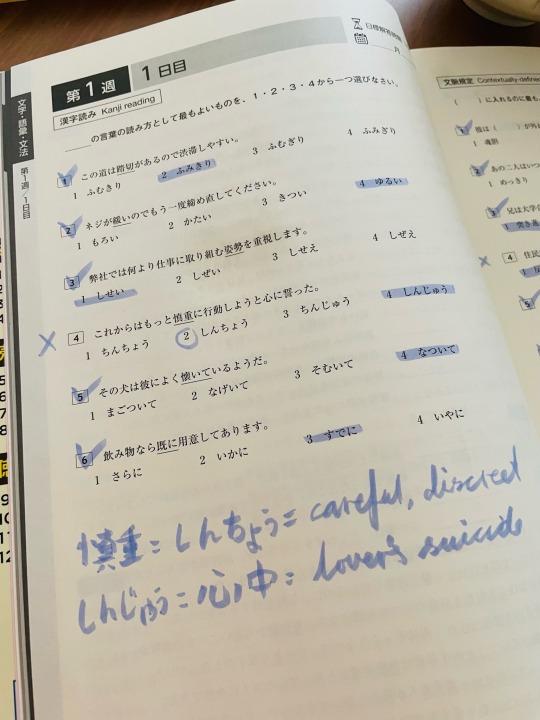
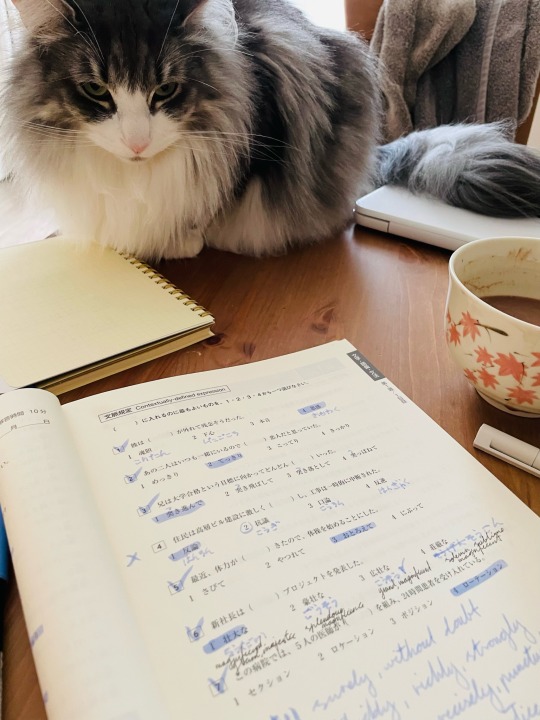


私の字はあまり綺麗じゃないけど、しょうがない。
#japanese#studyblr#langblr#japanese studyblr#japanese langblr#study#japaneseblr#japanese study#勉強#日本語#japanese language#日本語勉強#jlpt#cat#jlpt n1
144 notes
·
View notes
Text
王道進行の特徴
私たちが普段聴いているJ-POPやアニソンなどの定番曲には、かなり高い確率で「王道進行」が使われているそうです。こんな響きのコードになります♪
曲の中の1番盛り上がるパートのサビに使われていることが多く、4536進行『IV→V→IIIm→VIm』という構成になってます。
以前ここで詳しく書きました↓
例えば、Cメジャーの曲の場合、『F→G→Em→Am』の並びになり、前半二つがメジャーコード、後半二つがマイナーコードになっていることで、耳に残る響きになるとのこと。
メジャーコードは明るい響きの和音、マイナーコードが暗い響きの和音というと、わかりやすいかもしれません。
『F→G→Em→Am』の場合ですと、FとGがメジャーコード、EmとAmがマイナーコードになります。
乗っけはメジャーコードで明るいのに、急に少し暗くなるので、響きに影が出来て焦りを感じてしまうとのことで。
それによって展開に深みが出るため、耳に残るコード進行になると言われてみます♪
ミステリアスな響きが加わるといった捉え方でもいいかもしれませんね。
というわけで、サビに王道進行を使った曲を想定して、何個かサビを作ってみようかなぁと思ってます^ ^
2023/07/14
18:30
48 notes
·
View notes
Text
の particle - colloquial questions
this way of asking a question is a little more informal than desu ka. it's great to use with friends and family but you wouldn't use it at a more formal, for example, with acquaintances or coworkers.
do you like milk?
牛乳がすきの?
gyūnyū ga suki no?

#japanese langblr#japanese language blog#edward elric#alphonse elric#fma brotherhood#fma#fmab#no i hate milk#i have that in common with ed#japanese learning#japanese language#japanese with anime#japanese grammar#japanese particles#japanese question particles#nihongo o benkyou#nihongo#勉強
40 notes
·
View notes
Text
文法:〜ては(If・Because + Bad Result/Whenever ~/Repetitive Actions)
A(て-form)+は、B。
In spoken Japanese, ては and では become the contractions ちゃ and じゃ respectively.
We’ve seen ては combine with phrases like ならない、だめ、いけない to mean something that you “must not do.” However, ては has several different uses.
If・Because + Bad Result
Aては、B。
(A[普通形]+のでは、B。)*
If/Because A, then B (Bad Result).
This is the base form for the grammars てはいけない and しなくちゃならない. ては is a conditional whose usage is very similar to ~たら, but while ~たら is neutral, ては carries a negative implication. It's used to express a negative result due to some action, or even just one's negative reaction to that action.* While it's common to see it paired with だめ・ならない・いけない like in the above grammars, it is not limited to those endings.

先輩 ついてきちゃ意味ないです[ビクッ]
Senpai, there's no point if you're just going to follow me. [Startled]
[Speaker is on an errand from Senpai to fetch a drink.]
(『月刊少女野崎くん』 Girl’s Monthly Nozaki-kun,vol. 1 by Izumi Tsubaki)
Of course, depending on the translation, these alternate endings can still carry the meaning of "that must (not) be."

未来の僕の奥さんに傷が残っちゃ大変だ
It would be a problem if my future wife were scarred. (= I can't allow my future wife to be scarred.)
(『魔法使いの嫁』 The Ancient Magus' Bride, vol. 1 by Yamazaki Kore)
Whenever ~
While て-form is used to simply connect two clauses to indicate a simple sequence of actions, ては is used to describe an action that keeps happening. In this case, ては is only formed from verbs.*
A(Verb) て、B。
When A, then B.
A(Verb) ては、B。
Whenever A, then B.
These actions are habitual, with B happening every time A occurs. This meaning is not necessarily negative, and the phrase is not repeated.* *

そっ!あの赤いの行ったとこ
世界のいろんなとこ見たくてさ
バイトで金貯めちゃ旅してんだ
Yeah! Those red pins are the places I've been.
See, I really wanna travel all over the world,
And I go on a trip whenever I save up enough money working part-time.
(『あの日見た花の名前を僕達はまだ知らない。』 Anohana: The Flower We Saw That Day, vol. 1 by Okada Mari and Izumi Mitsu)
Repetition
ては can be used to emphasize two actions happening over and over, similar to ~たり~たりする. However, while たり gives several examples (out of many), ては really stresses the repetition.* These two actions can be completely unrelated, even opposite actions. The ては phrase can be repeated twice, or the order of the verbs even inverted to further emphasize the repetition. This form is only formed from verbs.
A(Verb) ては、B。
Do A and B repeatedly, every day, constantly, always.
A(Verb) ては、B、AてはB。
Repeatedly A-ing and B-ing, A-ing and B-ing.
A(Verb) ては、B、BてはA。
Repeatedly A-ing and B-ing, B-ing and A-ing.
When repeated twice, the two actions are opposites (ex: turn on and off, draw and erase, eat and sleep.)*

だから何度も目覚めては 確認するにゃ
So I keep opening my eyes over and over, just to check.
[To keep the cat pun, consider: "meowny times" instead of "over and over".]
(『おじさまと猫』 A Man and His Cat, vol. 1, by Sakurai Umi)
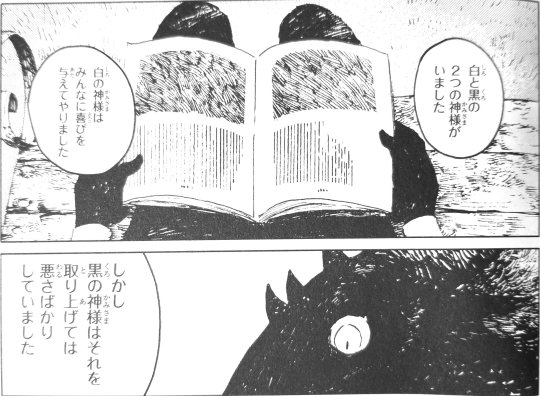
白と黒の2つの神様がいました
白の神様はみんなに喜びを与えてやりました
しかし黒の神様はそれを取り上げては悪さばかりしていました
There were two gods, one white, one black.
The white god bestowed joy upon everyone.
However, the black god constantly took that joy away, and wrought only evil.
[Language purposely elevated to keep the fairy tale/mythic feel.]
(『とつくにの少女』 The Girl from the Other Side: Siúil, a Rún, vol. 1 by Nagabe)
On top of the 3 usages above, Maggie-sensei lists a few more. Be sure to check out her page for more examples from a native speaker!
Advice & Suggestions
This one is another usage that is similar to ~たら, this time giving the advice a more elevated feel than the casual たら, or softens the impact of a straightforward ていただけませんか.
Aてはいかがでしょう。
Aてはいただけませんか。
Aては… [unfinished to allow listener to fill in the blanks]
Attempt with expected failure
ては is used to modify てみる when you're not optimistic about the outcome of an attempt.
Aてはみます。
I will at least give A a try...
J-Rock Examples:
山際も星も/ぼくらに気付いては/お話もした
Both the mountain ridge and the stars / Whenever they noticed us / Told us stories as well
[赤い光線 - 交信]
東京にすがりついては/泣きじゃくって 言えやしなくて
I’m always clinging to Tokyo / and crying and I just can’t say it
[関取花 - 東京]
革靴は知らぬうちに/あのリズムを奏でては列車中に空しく響く
Whenever my leather shoes unconsciously / tap out that rhythm, it echoes through the train in vain
[関取花 - 石段のワルツ]
124 notes
·
View notes
Text
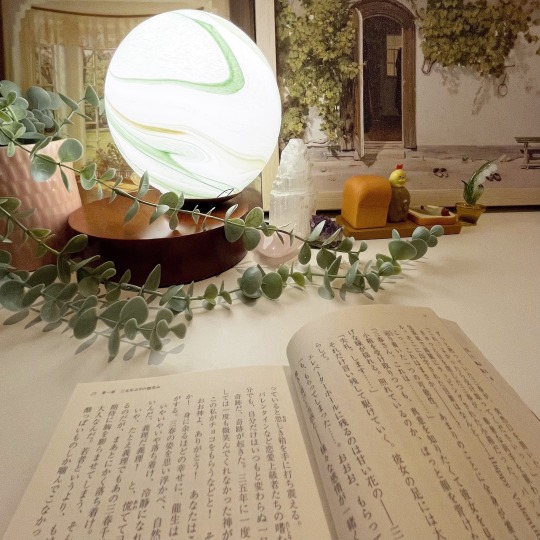
Have been reading more in jp and kr to build up my vocabulary 💗
#personal#studyblr#langblr#japanese#study#日本語#studyspo#language#jlpt#study community#勉強#日記#練習#japanese langblr#korean study#korean langblr#study motivation#study desk#language study#korean studyblr#korean study blog
297 notes
·
View notes
Text

受験生
#illustrators on tumblr#girl illustration#illusutration#original art#original character#一次#一次創作#イラスト#オリジナル#オリジナルイラスト#受験#勉強#電車#train#entranceexam
117 notes
·
View notes
Text



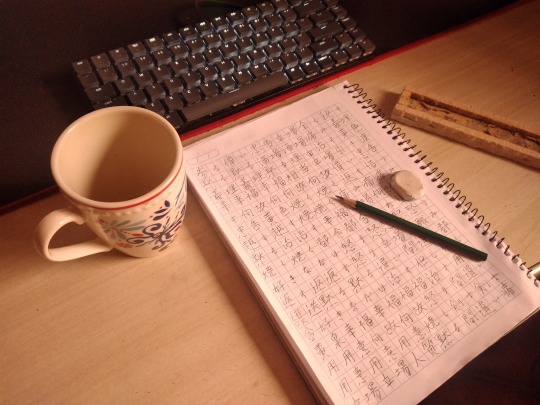
Hi Tumblr! My fiancée (@lulifelog) said I should create a tumblr blog, so I dicided to try it out.
My name is Luã (pronounced luh-an; calling me suugakusei, rage or anything else is fine), I'm an applied mathematics major from Brazil and a japanese student, currently on the JLPT N3 grind. I love studying and playing videogames, I have a lot of interest in japanese culture and language and I intend in working in tech in a few years. Mathematics is my life, and the epiphany of solving a good problem is my favorite feeling.
This blog is where I'll share my studying process and lifestyle, as well as some thing about my daily life, all along some cute pictures I might try to take (emphasis on "try") and maybe some music recommendations. So, if you have interest in that, I'll see you on your dash :)
I would also like to get to know some japanese speakers, because immersion is everything. では、tumblrの日本語を話す人たち、よろしく!
Today I had a nice little moment of comfortable japanese study.
I'm at the end of my university's summer break, so I'm free to do whathever. I try to study as much as possible, but the thought of spending hours mashing buttons on Guilty Gear is always a tease.
Just when I decided to catch up with my vocabulary Anki deck, a light rain started to pour, which makes studying the best. So I made some coffee, lighted an incense stick, put on Lamp's album Yume, a gorgeous and somewhat-strange piece of japanese jazz-pop, and got to work.

I always try to write my kanji as beautifully as possible, and I think today I managed to draw some nice characters. Nothing like getting a kanji to look just right.
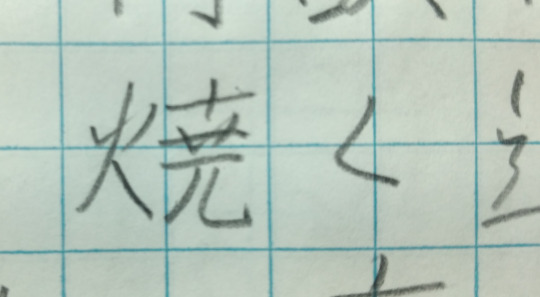
焼く (yaku), to burn
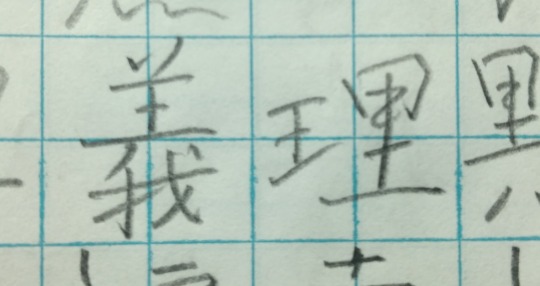
義理 (giri), honor
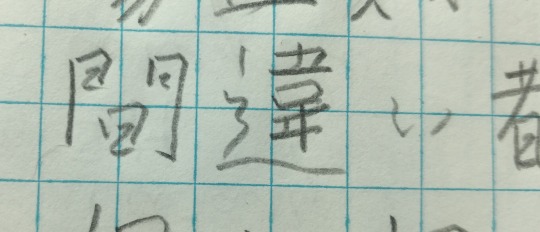
間違い (machigai), mistake
Japanese language students tend to dislike or even hate kanji because of the amount of work it tends to take to memorize them, including readings and stroke order. Despite that, it's my favorite aspect of the language. I just find them very beautiful and interesting, as the idea of a character that not only expresses sound but also an idea is very foreign to my strictly-phonetic mother language. Also, knowing a lot of them gives you bragging rights, which can't be bad.
As I was wrapping up the session, the Lamp album ended, so I played King Gnu's album Ceremony, which is an awesome alternative j-rock album with amazing melodies. It's also from the same band that composed one of the Jujutsu Kaizen openings, so some of you might be familiar. Their whole discography is worth checking out.
And that was all for today. I think I'll play some Persona 3 right now, even though I feel I should study more, as I always do. But I'm on my break, right? Nothing wrong with having some fun.
Have a good one everybody :)
#studyblr#studying#daily routine#langblr#japanese langblr#japan#japanese#kanji#intro post#coffee#photography#勉強#日本語#language#language learning#journal entry
7 notes
·
View notes
Text
⭐️Resume posts⭐️
※Please click likes,coz I‘d like to recognize how many people want to look at my post even now!!!
It has been a while!
(久しぶり!)
How are you everyone?
(皆さん元気にして��すか?)
I apologize for not being able to post for a while
,because I have been super busy for a work…
(仕事が忙しく、しばらく投稿ができずごめんなさい…)
I am resuming posts from today!
(今日から投稿を再開するよ!)
You are interested in casual Japanese phrase?
(カジュアルな日本語について興味ある?)
Let me know If you have questions and impressions about my blog and Japanese phrase you want to know anytime!
(投稿に関する感想や質問、希望があればいつでも聞いてね!)
I am going to reply it absolutely!
(絶対に返信するから!)
#japan#japanese#日本語#にほんご#勉強#べんきょう#learn japanese#learn#漢字#kanji#おいスーー!#casual#casual Japanese#casual Japanese phrase
28 notes
·
View notes
Text
研鑽
本日は在宅ワークにした。最近の仕事内容に嫌気も感じ、結局前職と同じになってるんじゃないかと悶々としている。前職と違うところといえば相談できる同期が多い事。聞いた手法を真似してこれからやっていこうと思った。1人じゃないのが強みだね。仕事内容から少し逃げたかったのもあるけれど、今月中に受検しなくちゃいけないテストがあってそれを受けた。結果として目標値以下で、結果を見たら悔しさで滾っていた。これからの世界を相手にするためのスキルの一つで独学していたものでもあったから知っている言語のはずなのに、が多くて腹が立った。あくまでこれは腕試し、という位置に立っていた試験だったけど、まだまだ悔しいので、わからなかった単語はメモして意味調べをして忘れないように綴った。ホットスタンバイで次はいるぞ。調べ直しているときに前に使ったテキストをひっくり返したんだけど、索引に大量のマーカーが引いてあって安心した。私はこれだけ学んできたんだという糧になっている。たまに落ち込んだ時高校の時使っていた、マーカーが沢山ひかれた単語帳を見て元気を出す。本気で取り組んでいたからこそ、過去の自分に鼓舞されているようで安心する。最近のイベント対応で、私の経歴を話すと「勉強が好きなんですね」と言われた。好きというか、まだまだ至らない自分だからこそいろんなことを知りたい学びたい。だからこそ、好きなタイプは「私が知らない知識をたくさん知っている人、博識な人」。学びにもコンプレックスを持っていて、高校大学受験の失敗が根底にあるからだと思う。今があるおかげはそれがあったからなんですけどね。登りつめていきたいが最近心にある。たまに文章で出てくる尊敬している友人である、女神は今年度末に仕事をやめて大学に入り直すと言っていた。彼女からその話を聞いた時にとても嬉しくてドキドキして泣いてしまうかと思った。学び合える友人は卒業したと共に周りにはほとんどいなくなってしまったけど彼女の生き様含めて尊敬しているので、これからも応援していきたい。学びはずっと忘れたくないね。彼女と今週末久しぶりに会うのでたくさんお話しするつもり。楽しみ。
17 notes
·
View notes
Text
実務者研修の学びへ。
2023年11月22日(水)に、無事に初任者研修の試験に合格する恵みが与えられました😊🙏
次は、実務者研修となるのですが、
私はこの初任者研修の学びと、仕事と、
教会の働きと家の家事仕事とか色々あり、
あまりにきつかったので…
次はもう良いかなぁ?と思っていました。
しかし、祈っていたら次に進むように感じさせられました。。(°_°)
信仰の対応という事柄も語られ…
えー😱という感じでしたが、介護の道に入ったなら、やはり進むしかないのか?
あと聞いた話によると、
初任者研修を学んだら、すぐに実務者研修の学びに入らないと、勉強するモチベーションが下がるみたいです。。
実務者研修は、1年で何回もあるわけではないため、この時期を逃すと少し待たなくてはいけないらしく、神さまに祈り、実務者研修の学校に行くことになりました🙏
1/10(水)が、オリエンテーションでした。
1/10(水)から4/30(土)までのミッションは、10枚のレポートを70点以上でクリアすること。不合格の場合には、再提出。クリアするまで出し続けること!
ワオ!🤯
4/30(土)と、5月、6月の土曜日は、
学校に行き、スクーリングになります。
Jesus、help me〜☆
m(_ _)m
昨日、やっと1枚目が終わりました。。o(^o^)o
感謝🥲/
2024.1.19.fri.☔️
in 長崎


12 notes
·
View notes
Text
N5 Grammar But Not Really
So if you've been doing your Genkis and whatnots you've likely come across the grammar point 「たり」, which you would use when you want to mention that you've done more than one action. Example sentence:
日曜日は買い物したり、映画を見たりした。。
"I went shopping and watched a movie on Sunday.
Okay but what if we used this grammar point of たり, and only listed one verb. Why would we do that? Let's take a look at a sentence from my last post.
「私はだれとも境遇を変えたりしないだろう」
"I won't let anyone change my circumstances."
So what is this grammar point doing here in this sentence? If we decided to remove that たりしない bit, it would turn into:
「私はだれとも境遇変えないだろう」
"I won't let anyone change my circumstances."
So this means the same thing directly translated, however the former, has a different nuance than the "standard" latter. Adding a たりしない to the sentence, emphasizes that it is very unlikely to change the circumstances in the above example.
Why could this be the case and why does it mean this? This is likely conjecture here based on some readings. Normally, when you use たり by itself, it means that aside from the singular action enlisted, other things may or may not happen. For example:
「今日は本を読んだりしたい」
"I want to read a book today"
The above sentence implies that aside from wanting to read something else, the subject would like to do other things that have not yet, if at all, been mentioned.
Using the same logic when looking at the 「私はだれとも境遇を変えたりしないだろう」 sentence, we can assume that you can't change the subject's circumstances, and nothing else can be done.
Hopefully I am correct on this, I can't find an explanation good enough for me to be 100% confident. Here's the sources (The latter was extremely useful):
#language#japanese#japanese language#japanese langblr#japanese learning#日本語#勉強#langblr#grammar#たりする#たり
121 notes
·
View notes
Text



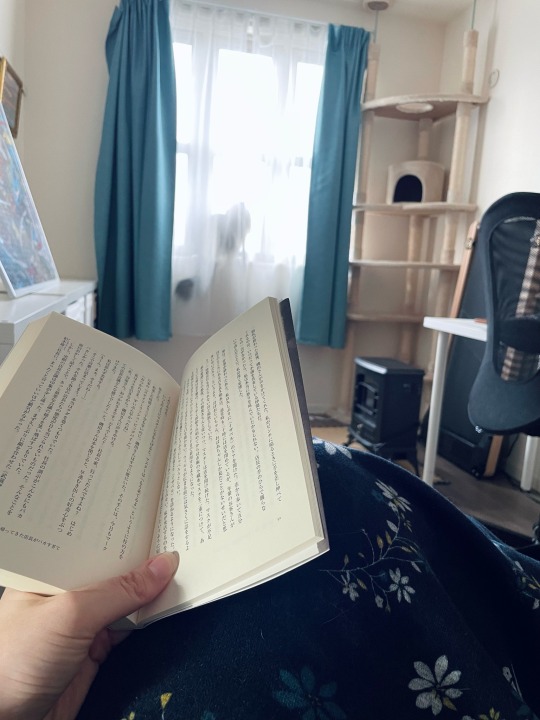
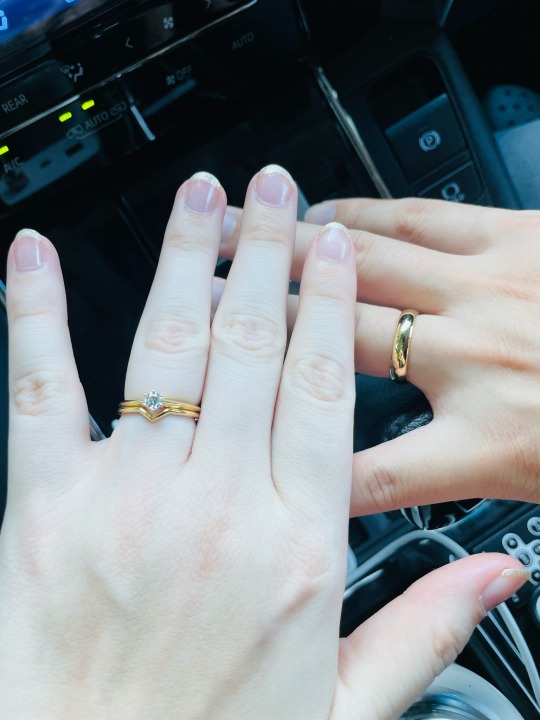
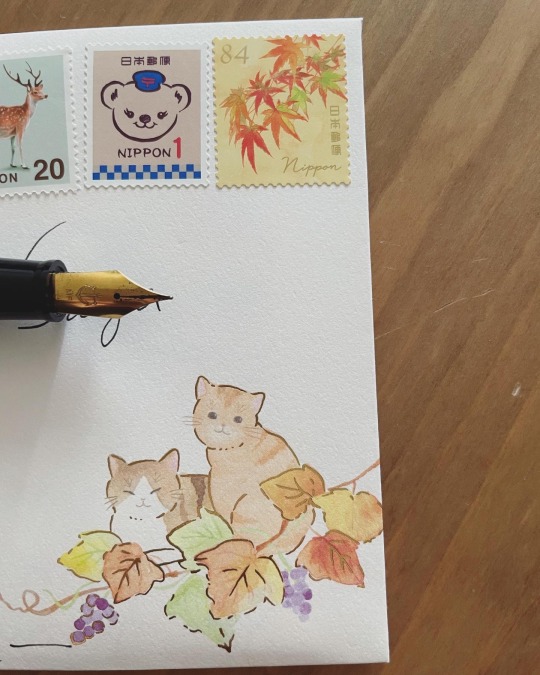
みなさま、お久しぶりです!
フォロワー5000人超えてしまった。たまにしか投稿しないのにね。みなさま、ありがとうございます🙇♀️
せっかくだから、何年前からやってない自己紹介をしようと思います。
初めまして!
オレンジでございます。30歳のノルウェー人で、5年間日本に住んでいます。前は愛知県も長野県も住んでいましたが、今は東京で働いています。
日本語を勉強するきっかけは小説が好きだからでした。村上春樹の本の全部を英語で読んで、「日本語で読んでみたい、どのぐらい違うかな」ってことでした。今は村上春樹より、他の作家さんと出会って愛読しています🙈
趣味は上にも述べたけど、読書。他によくしていることは、紅茶を飲んだり (本を読みながらw) 、片付けたり (家がいつも綺麗わけではないけど)、手紙を書いたり (日本の切手も好き)、料理とベーキングしたり、時々ハイキングしたりします。
好きなものは、愛猫のダージリンちゃん、甘いもの、文具、ミルクティー、手帳、秋、オレンジ色、編み物など。
今年 (2022年) やったことは結婚したことと運転免許を取得したことです(日本語で取得しました!ちょっと自慢させてください)。
そろそろ日本語能力試験を取得したいと思います。なぜかというと、日本語能力試験の本を手放したいだけです。あまりろくな理由ではないですけど、取得できずに手放すには気が進まないと感じます。
みなさま、よろしくお願い致します🙇♀️
Long time no post!
Even though I only post once in a while, I now have over 5000 followers. Thank you so much!
Since I haven’t done one in years, I thought it would be a good opportunity to do a new self introduction! So,
Hello!
I’m «orange». A 30year old Norwegian that has been living in Japan for 5 years now. Previously I lived in Aichi and Nagano prefectures, but now I work in Tokyo.
The reason I started studying Japanese was for my love of novels. I read all of Haruki Murakami’s books in English and thought «I want to read these in Japanese, I wonder how different they are». Now I am enjoying other Japanese authors maybe even more than Haruki Murakami🙈
Hobbies are, as stated above as well; reading. I also often drink tea (while reading), tidy and organize (not to say that my house is always tidy and clean), write letters (I also love Japanese stamps), cook and bake, and sometimes go hiking.
Things I love; my beloved cat Darjeeling, sweets, stationery, milk tea, planners, autumn, the colour orange, crafts etc.
Things I did in 2022; got married and got my driver’s license! (I got the license all in Japanese! Please excuse my bragging just this once haha)
I want to pass the jlpt soon, mostly just to be able to get rid of all the jlpt textbooks I have. While it is not the best reason, I feel like I can’t get rid of them without having passed so.
Yoroshiku everyone!🙇♀️
#japanese#studyblr#langblr#japanese studyblr#japanese langblr#study#japaneseblr#japanese study#勉強#日本語#japanese language#japan#book#cat#jlpt#language#jlpt n1
84 notes
·
View notes
Text
知らずに使っていた王道進行
前記事でも書きましたが、作曲に関する音楽理論を見直している中で、ここ数日では「よくあるコード進行」に注目しています。具体的には、音楽YouTuberのサッキーさんの動画を見ながら、ふむふむと勉強し直してます。
youtube
→サッキーさんのprofile
この動画の最初に紹介されている「王道進行」。
やはり、王道というくらいですから、誰もが耳にしている定番のコード進行なのです。
特に、j-Popやポップスで使われているとか。
別名、4536進行ともいいます。
コード進行のテンプレートは「Ⅳ(4)→Ⅴ(5)→Ⅲm(3)→Ⅵm(6)」
ここで気になるのが、「なぜ、4536なのか?」ですね。
その答えは、
設定したキーの1番目の音(ルート音)から数えた時の4番目、5番目、3番目、6番目の音を使ったコードが並べられた進行だからです。
たとえば、定番のCメジャーキーの1番目の音はC(ド)になり、スケールは「CDEFGAB」で、音階名で書くと
・C(ド)・D(レ)・E(ミ)・F(ファ)・G(ソ)・A(ラ)・B(シ)
です。
わかりやすく言うと、ドレミファソラシドですね。
そのように考えると、1番目の音はC(ド)で、4536進行で使われる4番目、5番目、3番目、6番目の音は、以下のようになります。
・F(ファ)ドレミファで4番
・G(ソ)ドレミファソで5番
・E(ミ)ドレミで3番
・A(ラ)ドレミファソラで6番
といった捉え方です。
それを、「Ⅳ(4)→Ⅴ(5)→Ⅲm(3)→Ⅵm(6)」のテンプレートにはめ込むと
・F(ファ)-G(ソ)-Em(ミ)-Am(ラ)
になります。
かなり多くの曲に使われているそうで。
私が今までに作った数曲のオリジナル曲にもしっかり使われていました笑。
考えなくても使ってしまっていると言う事は、相当に耳馴染み深いコード進行なのでしょう。
サンプル曲でよく紹介されているのは、以下の2曲です。
youtube
涙のキッス もう一度〜♪のサビのところで使われてます。
youtube
これもサビのところで使われているとか。有名な洋楽ですね。
聴いてみると「なるほど🤔」ってなりますね。
これで、何フレーズかを作ってみたいと思っています。
もちろん、この部分の進行だけで一曲を作るのは不可能なので、一曲にする場合は他の進行を混ぜたりとかの話になるかと思います。
それはまた、既存曲の譜面を見て分析しようとおもってます。
さて、次からは横浜で撮ってきた写真などを投稿します😊
2023/06/11
13:40
カナリヤ響子
#Youtube#ひとりごと#日記#音楽のある生活#音楽制作#音楽理論#作曲#音楽と人#音楽好きな人と繋がりたい#音楽#pop music#music#musician#勉強#youtuber#日常の記録
32 notes
·
View notes
Text
🌿~ ている form - continuous actions 🍂 🍁
Just one of the many ways you can use the - te iru form in japanese is for continuous actions or actions that are ongoing. It can give your sentences a softer and less definite feeling which can often be more natural :)
For example:
自然 に 歩き回ている は 安らか ですね。
shizen ni arukimawateiru wa yasuraka desu ne.
wandering in nature is very peaceful.




#japan aesthetic#japanese langblr#japanese language#nihongo#japanese learning#nihongo o benkyou#japanese grammar#勉強#japanese language blog#moomin art#moomins#snuffkin#snufkin moomin#snufkin#moomin aesthetic#moomin#snufkin and moomin#teiru form
48 notes
·
View notes